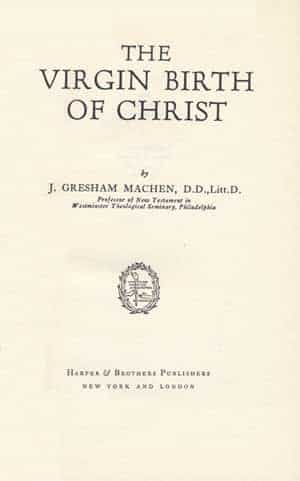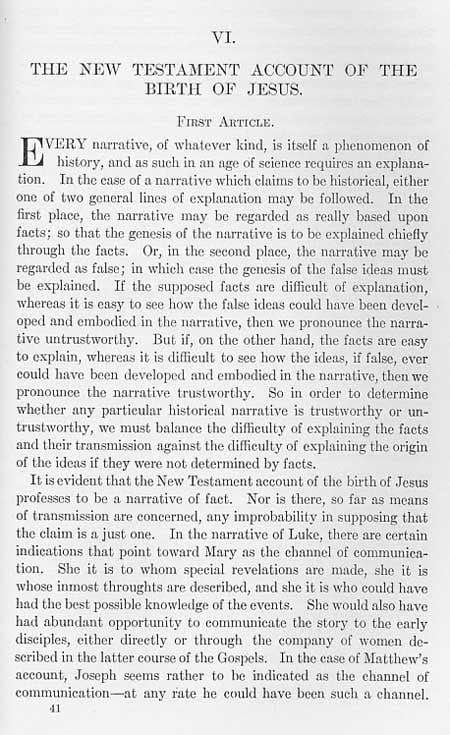This Day in Presbyterian History:
The Virgin Birth of Christ
 According to the universal belief of the historic Christian faith, including the evangelical and Reformed churches in the twenty-first century, Jesus of Nazareth was born without a human father, being conceived by the Holy Spirit, and born of the Virgin Mary. And many, if not all of our readers, would respond to this statement in the affirmative. But many negative replies would also be given in the church at large, from both those who stand behind the pulpit, to those who sit in the pew. There is a great divide in the visible church to this doctrine of the Virgin Birth of Jesus Christ. The answer to these objections has been for the past eighty years in the book by John Gresham Machen entitled “The Virgin Birth of Christ.”
According to the universal belief of the historic Christian faith, including the evangelical and Reformed churches in the twenty-first century, Jesus of Nazareth was born without a human father, being conceived by the Holy Spirit, and born of the Virgin Mary. And many, if not all of our readers, would respond to this statement in the affirmative. But many negative replies would also be given in the church at large, from both those who stand behind the pulpit, to those who sit in the pew. There is a great divide in the visible church to this doctrine of the Virgin Birth of Jesus Christ. The answer to these objections has been for the past eighty years in the book by John Gresham Machen entitled “The Virgin Birth of Christ.”
Published jointly in New York and England on March 13, 1930, this definitive book by the late Presbyterian scholar and seminary professor J. Gresham Machen continues to be referenced and quoted by Christians today. The late James Boice once said that a Harvard professor, who himself didn’t believe in the doctrine, stated that Machen’s book has never been answered. Though old by human standards, the book is as up-to-date as when it first was written.
It was originally written by Dr. Machen in response to the Presbyterian signers of the Auburn Affirmation who stated that it was not necessary to believe in the Virgin Birth as a statement of faith. Yet the Presbyterian General Assembly had stated it as a fundamental of the faith in 1910, 1916, and 1923. Its’ denial by the eventual 1294 ministers of the Presbyterian Church USA in 1924 brought the whole issue of theological liberalism to the forefront of that denomination.

Yet this book was no hastily written book by the New Testament professor at Westminster Seminary. Machen had begun to write about Christ’s supernatural birth in 1905 for the Princeton Theological Review scholarly magazine. Then, in 1906, 1907, 1908, 1912, 1915, and 1918, he had penned articles or reviewed other books on this topic. The theme of Christ’s supernatural birth was fresh on his mind and heart. This book was the result of all these articles and was designed to set down once and for all that a belief in the Virgin Birth was necessary for Christianity. Deny it, and you deny the authority of the Bible, the supernatural aspect of everything about Christ Jesus, including the good news of salvation itself. Machen himself said, “If the Bible is regarded as wrong in what it says about the birth of Christ, then obviously the authority of the Bible in any high sense is wrong.”
« Opening page of Machen’s 1905 article as it appeared in The Princeton Theological Review.
Words to Live By: For an exercise, think of all the cardinal doctrines of historic Christianity which would be compromised if the Virgin Birth of Christ did not take place. Then think of where you would be spiritually if they were not true! Last, thank God for past and present Christians who defended the historic Christian faith in teachings that you have listed on your exercise, and pray that you too will be “always prepared to give an answer to everyone who asks you to give the reason for the hope that you have.” (NIV) First Peter 3:15b
For more background on Machen’s study of this subject, click here.
For Samuel Craig’s review of The Virgin Birth of Christ, click here.
[Samuel Craig was the founder of the Presbyterian & Reformed Publishing Company.]
Through the Scriptures: Joshua 7 – 9
Through the Standards: Christ Executes the Office of Prophet
WSC 23 — “What offices does Christ execute as our Redeemer?
A. Christ, as our Redeemer, executes the offices of a prophet, of a priest, and of a king, both in his estate of humiliation and exaltation.”
WLC 43 — “How does Christ execute the office of a prophet?
A. Christ executes the office of a prophet, in his revealing to the church, in all ages, by his Spirit and word, in divers ways of administration, the whole will of God, in all things concerning their edification and salvation.”
WSC 24 — “How does Christ execute the office of a prophet?
A. Christ executes the office of a prophet, in revealing to us, by his word and Spirit, the will of God for our salvation.”
